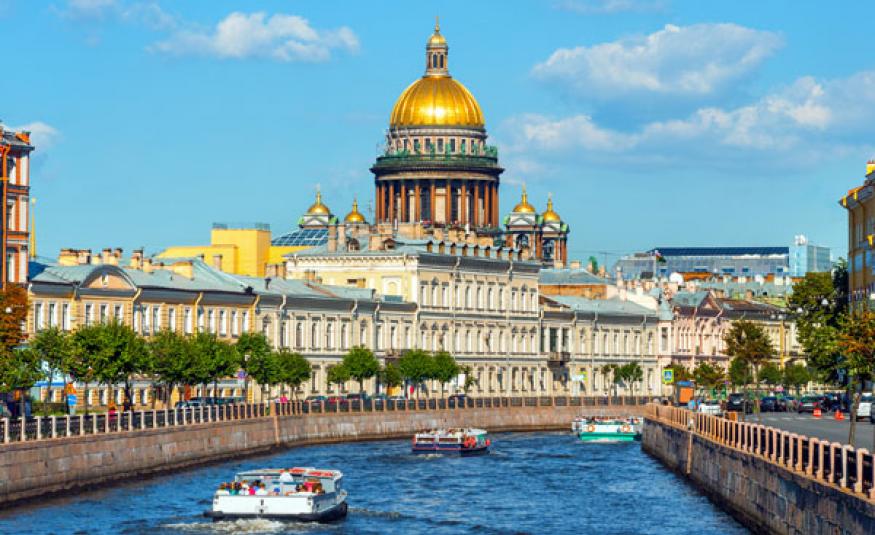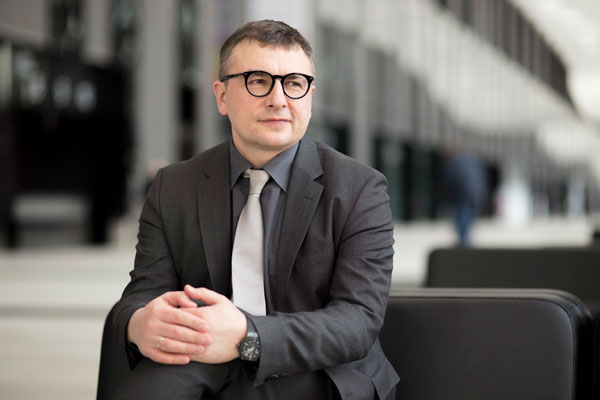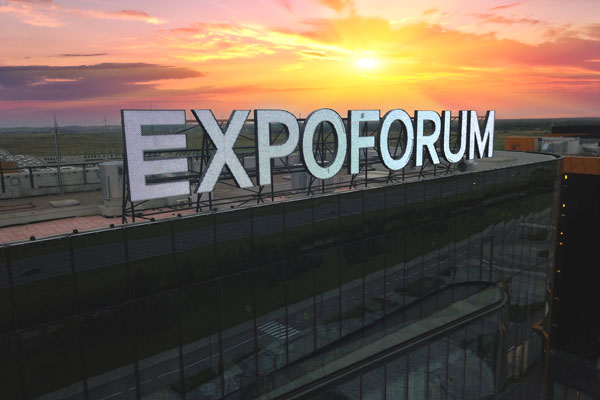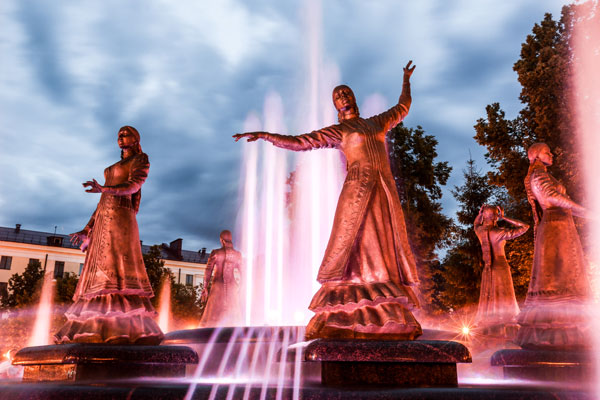In this month's cover feature, EW speaks to three key figures in the Russian events industry, and hears how the country is putting itself on the industry map.
Alexey Kalachev, director of the Russian Convention Bureau, is leading a new strategic push for events in Russia:
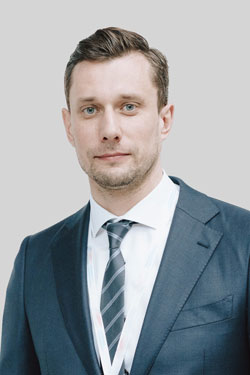 “The turnover of congresses in the world is estimated to be worth US$1 trillion, of which Russia’s share is currently less than one percent,” says RCB director Alexey Kalachev. “The main goal of our bureau is to improve this situation quickly. This is why the RCB was founded last year with support from the Government.
“The turnover of congresses in the world is estimated to be worth US$1 trillion, of which Russia’s share is currently less than one percent,” says RCB director Alexey Kalachev. “The main goal of our bureau is to improve this situation quickly. This is why the RCB was founded last year with support from the Government.
“We want to promote Russia as a preferred destination for hosting a wide range of activities and to attract major international events.”
Kalachev and his team are pushing hard on this, by actively organising fam trips, on-site inspections and taking a strong presence at leading industry trade fairs. The RCB is able to offer financial and administrative support for Russian and foreign organisers in presenting and managing their events in Russia.
Kalachev says the RCB’s focus will, initially be to promote the top 20 destinations in Russia abroad. And Kalachev underlines that Russia holds strong positions in many scientific fields and industrial sectors across its many regions.
“We have considerable experience as a host country for some mega international events,” he adds, and he lists the Winter Olympic Games in Sochi, G20 Meeting, APEC Summit, BRICS/SCO Summits in Ufa and others, plus the FIFA World Cup 2018 that took place across 11 cities.
After seven months of activity, Kalachev’s RCB has already gained 56 members – including regional convention bureaux, venues, PCOs, destination management companies and transport service providers, and is targeting more.
“By the end of 2018 we aim to have 100 members,” he says.
Kalachev’s team is already in the fast lane: “We have already started work with international associations and submitting bids for international events in Russia. Three winning bids to hold international events have already been scored,” he revealed.
For decades, St Petersburg had just one exhibition venue, Lenexpo. The city was in dire need of a state-of-the-art venue that could host conventions and exhibitions of international significance and, in 2014, ExpoForum opened as a multipurpose facility. CEO Sergey Voronkov (pictured above) takes up the story.
ExpoForum helped shape the convention and exhibition infrastructure not only in St Petersburg, but in Russia. Its unique capabilities allowed many projects to reach a new level. After the St Petersburg International Economic Forum (SPIEF) relocated from Lenexpo to ExpoForum in 2016, delegate numbers increased in three years from 7,000 to 17,000 in 2018.
In 2019, ExpoForum will also host the Congress of FECAVA (Federation of European Companion Animal Veterinary Associations) and the General Assembly of UNWTO. And there are event bookings for the next five years already.
The economic effect generated is evidenced by SPIEF in 2018 which saw 593 agreements worth a total of R2.625 trillion being signed.
The Russian conference and business meetings sectors are worth more than €500m a year, according to the R&C Exhibition Research and Development Centre. A total of 1,429 exhibitions were held in Russia in 2017, 200 of them in St Petersburg.
In the next four years, we will host 10 more global conventions at least, including the International Conference and Exhibition on Liquified Natural Gas 2022, and the World Energy Congress 2022.
Are the Lenexpo fairgrounds still part of your organisation?
This year the Lenexpo brand will celebrate its 50th anniversary and the ExpoForum brand its 10th.
Undoubtedly, Lenexpo is a legend of the event industry and today its pavilions host various projects, including the Permanent Centre for Import Substitution and Localisation, the Chinese Business Centre, and the Russia-Latin America Business Centre.
In June 2018, one of the Lenexpo pavilions inaugurated two mini-football fields and the St Petersburg Children’s Ice Palace. Lenexpo is also home to Tsing Grand Restaurant, the largest Chinese restaurant in the world.
Can St Petersburg become the MICE capital of Russia?
St Petersburg has a number of advantages and is not as overloaded as Moscow. It is our goal to become the centre of convention and exhibition expertise of this country.
According to the data of the Committee for Development of Tourism, more than 5,000 major conferences and exhibitions were held in St Petersburg in 2017, with tourism numbers growing 600,000, to 7.5m last year.
St Petersburg is the only city where the exhibition tourism industry has been included in municipal law. The city government aims to develop event tourism and decrease the role of the seasonal factor
Our own venue goal is to attract at least four-to-five global congresses a year to the city, involving from 2,000 to 5,000 participants.
Which foreign organisers are you working with?
ITE Group, Reed Exhibitions, Messe Dusseldorf, Messe Essen, Messe Frankfurt, Dolphin Exhibitions, Restec and others.
We have also agreed to host the next nine years of NEVA exhibition and Transtech conference events at our venue through to 2027.
The Russian Union of Exhibitions and Fairs (RUEF) unites 86 exhibition companies across the country. We talk to its current president and former UFI president, Sergey Alexeyev.
What trends are we seeing on the market?
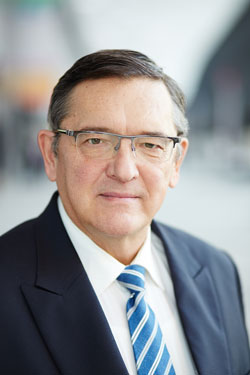 The Russian exhibition industry is influenced by economic and geopolitical instability, sanctions, and uncertainty on the domestic and international markets.Strange as it might seem, the situation also provides us with opportunities.
The Russian exhibition industry is influenced by economic and geopolitical instability, sanctions, and uncertainty on the domestic and international markets.Strange as it might seem, the situation also provides us with opportunities.
A key goal is import substitution, increasing the demand for Russian-made products, promoting their image and increasing their presence on the market. In this sense, the exhibition industry serves as the driver of the economy.
Exhibitions are a mirror of the economy and instability in the Russian economy over past years has meant declining statistical indicators for exhibition activities. This year, however, we have seen a rising number of foreign exhibitors, up 16% in the first half.
Which sectors are proving the best sources of business?
In 2017, agriculture, medicine, textiles, clothing, construction and chemicals provided most growth, mostly sectors reflecting effects of the policy of import substitution and promoting non-raw material export. Other promising areas include new technologies, aviation and armaments.
Industry exhibitions demonstrating good growth include ProdExpo, Furniture (Expocentre, Moscow), Russian Coal and Mining (Kuzbass Fair, Novokuznetsk), Intepolitex (Bizon, Moscow), Energetika & Elektrotekhnika (Energy Development and Electrical Engineering) (ExpoForum and Restec, St Petersburg), Mir Avtomobilya (Auto World), (Farexpo, St Petersburg), and agricultural exhibitions in Kazan, Ufa and Krasnodar.
How is the RUEF shaping industry development?
Recent achievements include getting new state support for the industry, first and foremost geared toward non-resource-based export and support of SMEs taking part in exhibitions.
In the summer of 2018, for example, all Russian exhibitions holding the RUEF- Approved and UFI-Approved Quality Certificates became eligible to have their expenses covered from the Moscow city budget.
Market transparency is increasing, as is the practice of auditing. In 2016-2017, we inspected 45% of the country’s exhibition space. The market’s trust in exhibitions as a marketing tool is increasing as a result.
Our goal now is to develop a law on exhibition activities to define the rules of the game.
How are Russia’s regional centres coping and are they attracting international events?
Regional exhibition centres were hit the hardest by economic instability of recent years. As we see the industry rebounding in Moscow and St Petersburg, regional exhibitions are showing the same results as last year at best. Some complexes switched from B2B to B2C events to increase revenues while others look at areas not directly related to the exhibition industry.
At the same time, new venues have appeared in Ekaterinburg, Krasnodar and Novosibirsk.
Are you capitalising on the success of the World Cup?
The World Cup showed that we can successfully hold top-level international events and that Russia is friendly and safe. The transportation system has been transformed; co-operation between security services of various countries practically eliminated crimes and the Fan ID project helped resolve visa issues. I witnessed people coming together in arenas and in fan zones. It brings to mind the words of John Lennon: “Imagine all the people, sharing all the world”.
However, taking part in Russian events is often challenging for foreign partners due to legislative, customs and visa problems. We need the support of the Government, and we need to introduce new legislation to make it easier.

